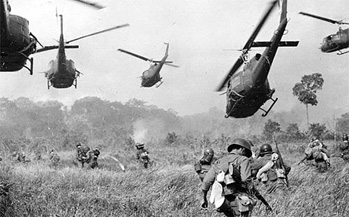TV Recap - The Vietnam War: Episode 1, Part 1
Episode 1
By Mark Light
September 21, 2017
The title is shown against a black backdrop, and then we see early morning shots of the Vietnam War Memorial in Washington, D.C., while Bob Dylan's "A Hard Rain Is Going To Fall" plays. The soundtrack to this film will be provided by Trent Reznor, by Yo-Yo Ma and the Silk Road Ensemble, and also by popular music of the era. Aspiring documentarians can learn from this technique. Music is not just something to keep the film from sounding quiet and creepy. It has a point and should be considered as carefully as the visual images of the film itself.
Max Cleland quotes Victor Frankl's "Man's Search For Meaning," and then the narrator, Peter Coyote, begins a brief summary of the war. When it ended, we had 58,000 American dead; at least 250,000 South Vietnamese troops died; over one million North Vietnamese soldiers and Viet Cong guerrillas were killed; and around two million civilians from both South and North Vietnam as well as tens of thousands more civilians from Laos and Cambodia were believed to have died in this conflict as well. Such a staggering cost in precious life alone behooves us to study this conflict, if only to somehow avoid the missteps that lead to this tragedy.
Bao Ninh, a Noth Vietnamese veteran, is next to speak. He tells us that even the Vietnamese veterans will not talk about the war. To him, who won and who lost is not a question. He feels in war that everybody loses. There is only destruction. Who won and who lost, Mr. Ninh says, is a question asked only by those who never fought.
The French attacked the port of Da Nang in 1858. It was the start of a fifty-year-long fight that left the French in control of the area known then as Indochina and is now the nations of Cambodia, Laos, and Vietnam. Here we see the understandable weakness of the film. Even though it promises to be 18-hours-long, there is so much material, so much history, that in a lot of cases the film cannot stop to ask questions. The viewer must ask the questions for themselves and to themselves. Any questions you might have about the nature and purpose of European colonialism must be tabled for your own research later. It is enough right now in the film to simply state that it happened. It has to move on.
Nationalist resentment in Vietnam was on the rise by the early 20th century. Tran Ngoc Toan, a South Vietnamese Marine veteran, spoke about their history there. Though Mr. Toan and Mr. Ninh fought on different sides in the war, they agree upon one point. Vietnam needed to be free and independent and the French needed to just leave.
We then see film footage of French rule in the early 20th century. Next, the film jumps to 1967 and footage of American troops rolls. John Musgrave, a Marine Corps veteran of 1967 talks. This is something that is done quite often in episode one. The film effectively takes a leap forward from whatever time it was to the time of peak American involvement in the war. It highlights a specific point to be made, but also one in general: the seeds of the future were sown in the past.
Continued:
1
2
3
4




